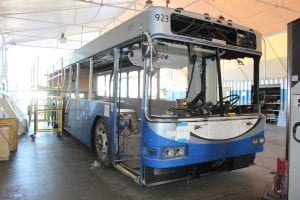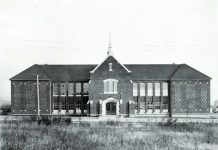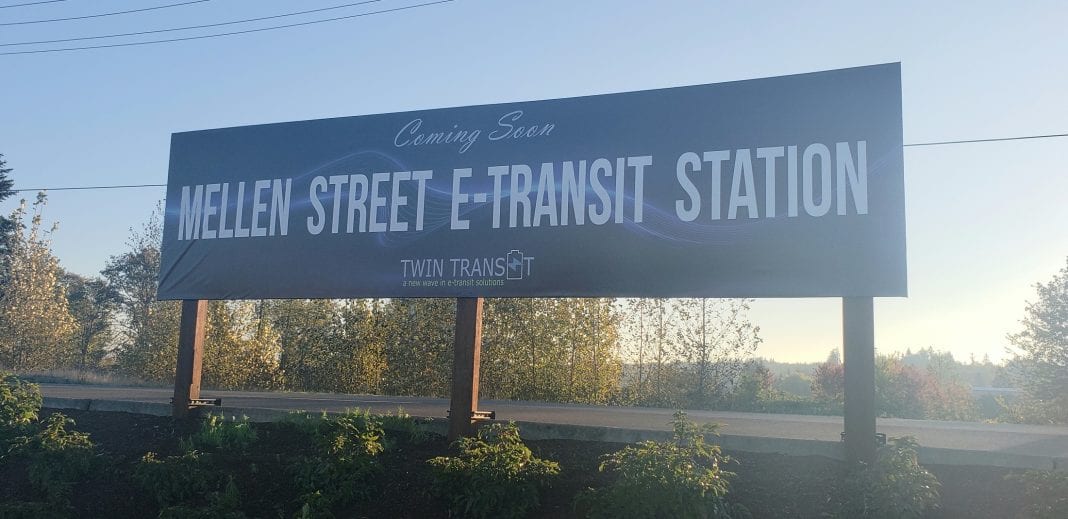Exciting things are happening in Lewis County. TransAlta is developing a new wind farm and solar array. Providence just installed the largest rooftop solar array of any medical provider in Washington State. And Twin Transit is launching a revolutionary new clean energy transportation initiative.
Electric Buses

Two new electric buses will soon be joining the Twin Transit fleet! The 2004 35-foot Gillig diesel buses are currently being converted into ZEPS (Zero Emission Propulsion System) buses by Complete Coach Works. This process of remanufacturing old buses into like-new ZEPS all-electric drivetrain systems reduces waste, maximizes resources, and decreases pollution and cost.
“In addition, electric buses are much more enjoyable for riders and the community at large,” said Twin Transit Community Relations Director Andrea Culletto. “They’re much quieter, the ride is smoother, and they don’t produce exhaust.”
The introduction of electric buses is just the first step in Twin Transit’s plans for a more eco-friendly and financially responsible future.

Mellen Street e-Transit Station
Twin Transit is also preparing to break ground on an exciting new clean energy project. Through a cooperative lease agreement with the Washington State Department of Transportation, Centralia’s current Mellen Street Park and Ride will soon become the Mellen Street e-Transit Station. When complete, this new transportation hub will feature bus wave induction charging to help power electric buses in-route, electric vehicle charging, ample parking, bicycle and pedestrian access, and visual enhancements.
“The Mellen Street e-Transit Station will be a major asset to our community,” Culletto said. “It will reduce our environmental impact, decrease traffic congestion, beautify the area, draw visitors, and improve the way our community moves. It also includes pedestrian and bicycle access with connections to local trails. This will make it easier to combine walking, biking, and riding the bus. It’s a healthier, more dynamic way for folks to get where they need to go.”
Perhaps the most exciting part of the Mellen Street e-Transit Station is the inclusion of wave induction charging. This technology works similarly to wireless cell phone chargers, in which you simply set your phone on a pad to charge it. In this case, an electric bus parks on top of a wave induction pad installed in the concrete to begin charging. This process bump charges the bus throughout the day, powering it on-route and increasing battery life.
Transportation Hub

When the Mellen Street e-Transit Station is complete, it will service Twin Transit’s Centralia and Chehalis routes – and its new pilot route connecting to Intercity Transit in Tumwater, which is anticipated to begin in early 2021. This new connection makes it easier for people to commute to work, seek medical care, shop, or visit friends and family to the north. It also sets the stage for future expansions, including a potential southern connection to RiverCities Transit in Kelso/Longview.
The Mellen Street e-Transit Station will also make it easier for vanpool groups. There is ample parking for everyone to meet at the station, park, and ride where they need to go. This reduces our area’s environmental impact and decreases traffic congestion on the roads and highways.
Similarly, the Mellen Street e-Transit Station also makes it easy for electric car users to park and hop on a bus to the Twin Cities’ historic downtowns, while their vehicle charges. Visitors can eat at local restaurants and enjoy the area, increasing tourism and commerce in the process.
Financial Benefits

In addition to increased commerce from improved access, the Mellen Street e-Transit Station will financially benefit our region by supplying local jobs and increasing tax dollars. Centralia’s SCJ Alliance is managing the project and Chehalis’ Barcott Construction Inc. will be completing construction.
The Mellen Street e-Transit Station initiative was funded through a combination of multiple grants. A Green Transportation Capital Grant is funding the construction of the e-Transit Station and a small portion of the purchase of the electric buses. The remaining electric bus cost is funded by Volkswagen Settlement dollars and a DERA (Diesel Emission Reduction Act) Grant.
Future of e-Transit
The electric buses and Mellen Street e-Transit station are an exciting part of Twin Transit’s multi-phase clean energy plan. Next is a similar functional update on National Avenue, to include improved flatwork visual enhancements, and preparation for another wave induction charger and electric vehicle charging in the future. Watch for those updates in early 2021. The organization plans to further expand the network of e-Transit Stations and zero-emission transit from there.
By incorporating electric technology, Twin Transit will serve our region in a more beneficial, sustainable, and ecologically responsible manner. These additions will be more visually appealing, environmentally friendly, and bring more people to the area. Most importantly, they will improve local public transit and connect the system with outlying regions, helping people move more fluidly in the Twin Cities and beyond.
Sponsored













































